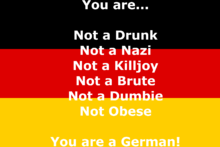Stereotypes of Germans
Stereotypes of Germans include real or imagined characteristics of the German people used by people who see the German people as a single and homogeneous group.



History
After the German reunification in 1990, the fear of nationalistic misuse of Pan-Germanism nevertheless remained strong. The overwhelming majority of Germans today are not chauvinistic in nationalism, but in 2006 and again in 2010, the German National Football Team won third place in the 2006 and 2010 FIFA World Cups, igniting a positive sense of German pride, enhanced by success in sport. For decades after the Second World War, any national symbol or expression was a taboo.[1] However, Germans are becoming increasingly patriotic.[1][2][3]
There exist stereotypes of Western Germans Wessis, especially Besserwessis (people who always know better), and Eastern Germans Ossis.[4]
No small talk
Some people think that the Germans are all straightforward and undiplomatic. The perceived inability of the Germans to engage in small talk and their unromantic nature are discussed by foreigners. As far as a German is concerned, "A yes is a yes and a no is a no."[5]
Nazis

Due to collective guilt attributed to Germany and the German people for perpetrating the Holocaust and starting World War II, Germans are often stereotyped as Nazis. This stereotype, while now rare, persists to this day. After the war, the German people were often viewed with contempt because they were blamed by other Europeans for Nazi crimes. Germans visiting abroad, particularly in the 1950s and 1960s, attracted insults from locals, and from foreigners who may have lost their families or friends in the atrocities. Today in Europe and worldwide (particularly in countries that fought against the Axis), Germans may be scorned by elderly people who were alive to experience the atrocities committed by Nazi Germans or by veterans who had fought against the Nazis during World War II. This resulted in a feeling of controversy for many Germans, causing numerous discussions and rows among scholars and politicians in Post-War West Germany (for example, the "Historikerstreit" [historians' argument] in the 1980s) and after Reunification. Here, the discussion was mainly about the role that the unified Germany should play in the world and in Europe. Bernard Schlink's novel The Reader concerns how post-war Germans dealt with the issue.
No sense of humour
Germans are perceived to be stiff and humourless.[6] They are presented this way in the Funnybot episode of South Park. At work, the Germans are very serious, but in their free time, they are completely different.Edward T. Hall, an American sociologist and intercultural expert, has identified certain dimensions to explain cultural differences. He noted in particular that the Germans are task-oriented people, while the French for example prefer personal relationships. [7]
Extremely punctual people
According to the stereotype, in Germany, everything happens exactly as per schedule and Germans do not tolerate being late for any occasion and are proud of their punctuality.[8] An exception is the German railroad system, which occasionally runs late.[9] The punctuality and discipline of the German people is also ridiculed by newspapers like the Guardian.[6]
Love of order
Attachment to order, organisation and planning is a trait of German culture. Germany has an abundance of rules and Germans appear to enjoy obeying them.[10]
Three Men on the Bummel
Jerome K. Jerome's novel Three Men on the Bummel makes fun of the perceived German craving for rules and passion in obeying them. The regimented life of German people is discussed in detail in this novel.[11]
German women
There are assumptions that German women are cold and unromantic. Some people even assume that German women are unable to cook. [12]
Wrong stereotypes
Some of the popular assumptions about Germans can be quite imaginative. The outward seriousness of the German people can lead to assumptions that they are cold and unromantic people. The kindness of the average German may not be observed by the casual tourist who only notices a reluctance to deal with perfect strangers.[13]
The kitsch
The idea of kitsch comes from Germany, the word is German. A stereotypical example is a Garden gnome.[14]
See also
- Stereotype
- Stereotypes of Jews
- Stereotypes of South Asians
- Stereotypes of Americans
- Stereotypes of African Americans
- Three Men on the Bummel, an English novel by Jerome K Jerome, set in 19th-century Germany
References
- 1 2 "Proud German?". The Economist. 22 March 2001. Retrieved 15 September 2016.
- ↑ Hall, Allan (19 May 2009). "Just Don't Mention Hitler: Young Germans learn to fall in love with their country again". London: Daily Mail. Retrieved 15 September 2016.
- ↑ "Are Germans now proud to be Germans?". generationaldynamics.com. 23 June 2006. Retrieved 15 September 2016.
- ↑ Typically Ossi -- Typically Wessi, DW
- ↑ Schäferhoff, Nick (9 November 2014). "9 German Stereotypes That Are Straight Up True". Fluentu.com. Retrieved 15 September 2016.
- 1 2 Erlinger, Rainer (27 January 2012). "German stereotypes: Don't mention the towels". The Guardian. Süddeutsche Zeitung. Retrieved 15 September 2016.
- ↑ https://howtoguide.org/german-humor/
- ↑ Zudeick, Peter (9 December 2012). "Germans and punctuality". dw.com. Retrieved 16 September 2016.
- ↑ Michelle (20 December 2012). "German Stereotypes…truths! lies! and more!". Confessedtravelholic.com. Retrieved 15 September 2016.
- ↑ Zudeick, Peter (19 November 2012). "Order makes Germans' world go round". dw.com. Retrieved 16 September 2016.
- ↑ Simon T (5 December 2012). "Three Men on the Bummel – Jerome K. Jerome". Stuckinabook.com. Retrieved 15 September 2016.
- ↑ Boom, Richard (14 September 2015). "What are some stereotypes about German women?". Quora. Retrieved 15 September 2016.
- ↑ Olga (27 March 2015). "8 False German Stereotypes". The Russian Abroad. Retrieved 15 September 2016.
- ↑ Stereotype. Was ist typisch deutsch?